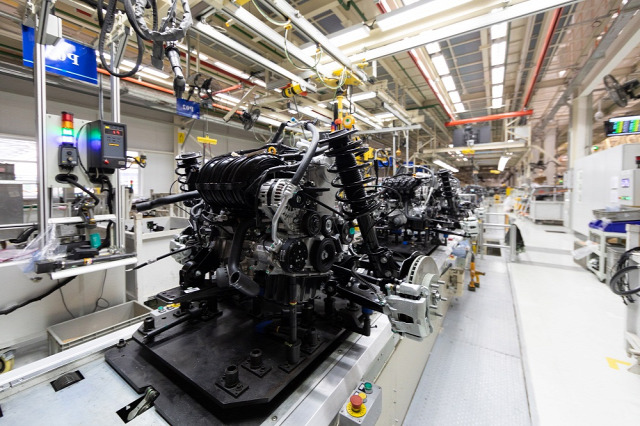
Direct current (DC) motors have been pivotal in powering a vast array of devices and machinery for over a century. From the humble beginnings of the first practical DC motor developed by William Sturgeon in the 1830s to today's sophisticated applications across industries, DC motors have witnessed significant advancements, making them indispensable in modern technology.
The global DC motor market is projected to reach $74.36 billion by 2033 from $34.31 billion in 2023, growing at a CAGR of 8.04% during the forecast period 2023-2033. The market is at a growing stage and is projected to experience steady growth. Players in the market are investing in research, product launches, and partnerships to expand their customer base and enhance market share.
Direct Current Motor Market Dynamics
The DC motor market has seen dynamic shifts in recent years due to advancements in technology, changes in consumer preferences, and emerging industrial trends. Several factors are driving the growth of the DC motor market:
-
Industrial Automation: With the rise of Industry 4.0 and the increasing adoption of automation in manufacturing and process industries, there is a growing demand for reliable and efficient motors to drive machinery and equipment.
-
Renewable Energy Integration: DC motors play a crucial role in renewable energy systems such as wind turbines and solar tracking systems, where they are used to convert the variable DC output from solar panels and wind turbines into usable electrical power.
-
Electric Vehicles (EVs): The transition towards electric vehicles is accelerating, driven by concerns over environmental sustainability and energy efficiency. DC motors are widely used in electric vehicles for propulsion, power steering, and other auxiliary functions.
-
Consumer Electronics: DC motors are extensively utilized in a wide range of consumer electronics products, including home appliances, personal grooming devices, and automotive components, fueling demand in the consumer electronics market.
-
Medical Devices: The healthcare industry relies on DC motors for various applications, including surgical tools, diagnostic equipment, and patient care devices, driving growth in the medical sector.
Request A Free Detailed Sample on Direct Current Motor Market!
Key Applications in Direct Current Motor Market
- Automotive
- Power Tools
- Consumer Electronics
- Industrial Machinery
Technological Advancements
Advancements in materials science, motor design, and control systems have significantly enhanced the performance, efficiency, and reliability of DC motors. Key technological trends shaping the DC motor market include:
-
Brushless DC Motors (BLDC): BLDC motors offer several advantages over traditional brushed DC motors, including higher efficiency, lower maintenance requirements, and quieter operation. These motors are increasingly replacing brushed DC motors in applications where precise control and high reliability are essential.
-
Integration of Electronics: The integration of electronic components such as microcontrollers and sensors enables advanced control and monitoring capabilities in DC motors, facilitating efficient operation and predictive maintenance.
-
Efficiency Optimization: Manufacturers are focusing on improving the efficiency of DC motors through innovative designs, optimized magnetic circuits, and advanced winding techniques to meet stringent energy efficiency standards and reduce operational costs.
-
Miniaturization: There is a growing trend towards miniaturization of DC motors, driven by the demand for compact and lightweight solutions in portable devices, robotics, and medical implants.
-
Smart Motor Technologies: Smart motor technologies incorporating features such as remote monitoring, condition monitoring, and predictive maintenance are gaining traction, enabling proactive management of motor assets and reducing downtime.
Market Challenges and Opportunities
Despite the promising outlook, the DC motor market faces several challenges, including:
-
Competition from Alternating Current (AC) Motors: AC motors, particularly three-phase induction motors, pose stiff competition to DC motors in various applications due to their lower cost, simplicity, and reliability.
-
Environmental Regulations: Stringent environmental regulations aimed at reducing carbon emissions and promoting energy efficiency are driving the demand for eco-friendly motor solutions, presenting both challenges and opportunities for DC motor manufacturers.
-
Supply Chain Disruptions: The global supply chain disruptions caused by events such as the COVID-19 pandemic and geopolitical tensions have impacted the availability of raw materials and components, posing challenges for DC motor manufacturers.
However, these challenges also present opportunities for innovation and market expansion. The increasing focus on sustainability, coupled with advancements in motor technology, opens up new avenues for growth in areas such as electric mobility, renewable energy, and smart infrastructure.
Access More: Get Detailed Insights on Auto Parts and Electronics Market Reports
Future Outlook
Looking ahead, the DC motor market is poised for continued growth, driven by the increasing adoption of automation, electrification, and renewable energy solutions across various sectors. Manufacturers will continue to invest in research and development to enhance the performance, efficiency, and reliability of DC motors, catering to the evolving needs of industries and consumers alike. Additionally, partnerships and collaborations between industry players and research institutions are expected to foster innovation and drive market expansion in the coming years.
In conclusion, the DC motor market remains a vital component of the global industrial landscape, with a rich history of innovation and a promising future driven by technological advancements and emerging market trends. As industries continue to evolve and embrace new technologies, DC motors will continue to play a central role in powering the machines and devices that drive progress and prosperity.

